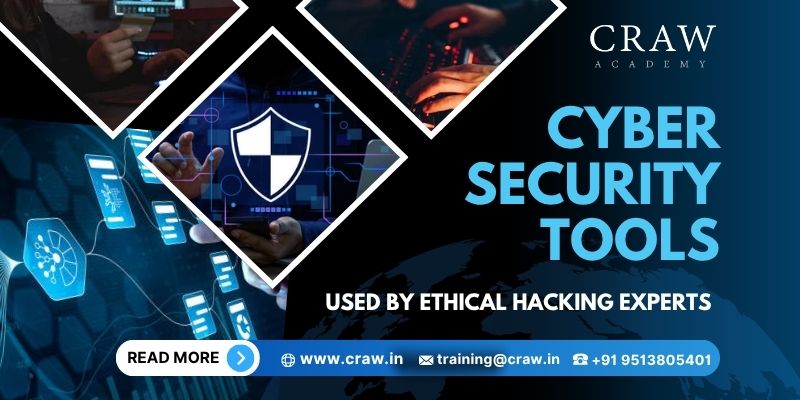Introduction: Cybersecurity Tools Used by Ethical Hacking Experts
In an age where cyberattacks are increasing in both frequency and complexity, organizations require skilled professionals to protect their digital assets. Ethical hackers—commonly known as white-hat hackers—play a crucial role in this effort. These cybersecurity professionals use a range of specialized tools to identify, test, and patch vulnerabilities in IT systems.In this article, we’ll explore the top cybersecurity tools used by ethical hacking experts and how mastering them can kickstart your career in ethical hacking and cybersecurity.
Get instant answers about our Ethical Hacking & Cybersecurity Courses directly from our experts.
💬 Click to Chat Now on WhatsApp:
Ethical hackers and penetration testers use a variety of specialized tools to identify vulnerabilities, test systems, and secure digital environments. These tools fall under categories such as network scanning, vulnerability assessment, password cracking, exploitation, and digital forensics.
What Are Cybersecurity Tools?
Cybersecurity tools are software applications or platforms designed to protect digital infrastructure from unauthorized access, breaches, and other cyber threats. Ethical hackers use these tools to simulate cyberattacks, perform vulnerability assessments, and strengthen system defenses.
Top Cybersecurity Tools Used by Ethical Hackers
Reconnaissance & Information Gathering Tools
- Nmap – Network mapping and port scanning tool
- Recon-ng – Web-based reconnaissance framework
- Maltego – OSINT tool for data mining and link analysis
- Shodan – Search engine for exposed devices/services on the internet
- theHarvester – Collects emails, domains, and subdomains
Vulnerability Scanning Tools
- Nessus – Industry-standard vulnerability scanner
- OpenVAS – Open-source vulnerability assessment system
- Nikto – Web server vulnerability scanner
- QualysGuard – Cloud-based scanning and compliance platform
Exploitation & Penetration Testing Tools
- Metasploit Framework – Popular tool for developing and executing exploits
- BeEF (Browser Exploitation Framework) – Exploits web browsers
- SQLmap – Automated SQL injection and database takeover tool
- MSFvenom – Payload generator for reverse shells and exploits
Wireless Network Testing Tools
- Aircrack-ng – Suite for auditing wireless networks
- Wireshark – Packet analyzer for network traffic
- Kismet – Wireless network detector, sniffer, and intrusion detection
- Fern WiFi Cracker – GUI tool for wireless penetration testing
Password Cracking & Brute Force Tools
- John the Ripper – Fast password cracker
- Hashcat – Advanced GPU-accelerated password recovery tool
- Hydra – Network login password brute-forcing tool
- Cewl – Custom wordlist generator for password attacks
Web Application Testing Tools
- Burp Suite – Web vulnerability scanner and proxy
- OWASP ZAP (Zed Attack Proxy) – Open-source web app scanner
- Wapiti – Web app vulnerability scanner
- Fiddler – HTTP debugging proxy tool
Social Engineering Tools
- SET (Social-Engineer Toolkit) – Automated phishing and social engineering attacks
- King Phisher – Phishing campaign toolkit for red teams
- Gophish – Phishing framework to test human security
Digital Forensics & Malware Analysis Tools
- Autopsy – Digital forensics platform
- Volatility – Memory forensics framework
- FTK Imager – Disk imaging and analysis tool
- PEStudio – Static analysis of executable files
- OllyDbg / x64dbg – Malware debugging tools
Operating Systems for Ethical Hacking
- Kali Linux – Most popular Linux OS for penetration testing
- Parrot Security OS – Lightweight alternative to Kali
- BackBox – Ubuntu-based distro for security analysis
- Tails – Privacy-focused OS for anonymous browsing
SIEM & Log Analysis Tools
- Splunk – Real-time data analysis and monitoring
- ELK Stack (Elasticsearch, Logstash, Kibana) – Centralized logging and visualization
- OSSEC – Host-based Intrusion Detection System
- Graylog – Log management and analysis
Who Should Learn Cybersecurity Tools?
These tools are essential for:
- Cybersecurity aspirants
- Penetration testers
- Network security administrators
- CEH certification candidates
- Students pursuing ethical hacking training
Why Ethical Hackers Use These Tools
Ethical hacking experts use these tools for several important reasons:
- To identify and patch security vulnerabilities
- To simulate real-world cyberattacks
- To ensure regulatory compliance
- To conduct security audits and assessments
- To protect sensitive data and systems
Frequently Asked Questions (FAQ)
1. Can I use these tools without a cybersecurity background?
While some tools have user-friendly interfaces, having a foundational understanding of networking, operating systems, and cybersecurity principles is recommended.
2. Are these cybersecurity tools free to use?
Many tools like Nmap, Wireshark, SQLmap, and Hydra are open-source and free. However, tools like Burp Suite Pro or advanced modules in Metasploit may require a paid license.
3. Is it safe to install and use these tools on my personal computer?
It’s safe if used responsibly in a controlled lab environment. Avoid using them on unauthorized systems to prevent legal consequences or data loss.
4. What is the role of these tools in penetration testing?
These tools help ethical hackers scan systems, exploit vulnerabilities, and generate detailed reports to improve the organization’s security posture.
5. Do Craw Security courses cover all these tools practically?
Yes, Craw Security’s ethical hacking and cybersecurity courses offer hands-on training in industry-leading tools using real-time labs and case studies.
6.How do I practice using tools like Metasploit or Wireshark safely?
Set up a virtual lab using tools like VMware or VirtualBox and simulate attacks on test machines using platforms like Kali Linux and Metasploitable.
7. Are cybersecurity tools legal to use?
Yes, when used by certified ethical hackers or in an authorized environment, these tools are completely legal.
8. What is the best tool for ethical hacking beginners?
Nmap and Wireshark are beginner-friendly tools to start learning about network scanning and traffic analysis.
9. Do ethical hackers need to learn coding?
While not mandatory for every tool, understanding languages like Python, Bash, and JavaScript can be highly beneficial.
10. How can I practice using these tools?
You can set up a virtual lab using platforms like VirtualBox or use online labs such as Hack The Box and TryHackMe.
11. Where can I learn ethical hacking in Delhi?
Craw Security offers comprehensive ethical hacking and cybersecurity training with a focus on practical tool-based learning.
Conclusion
Ethical hackers must be proficient with a wide range of tools to simulate cyberattacks and strengthen system defenses. Mastery of these tools is essential for certifications like CEH, OSCP, and real-world penetration testing roles.
Cybersecurity tools are the weapons in the arsenal of every ethical hacker. From scanning networks to simulating attacks, these tools help professionals secure digital systems and combat cyber threats. If you’re looking to become a skilled ethical hacker, learning these tools under expert guidance is crucial.
Craw Security offers the perfect blend of theory and practical experience to help you master these tools and build a successful cybersecurity career in India and beyond.
Get instant answers about our Ethical Hacking & Cybersecurity Courses directly from our experts.
💬 Click to Chat Now on WhatsApp:



